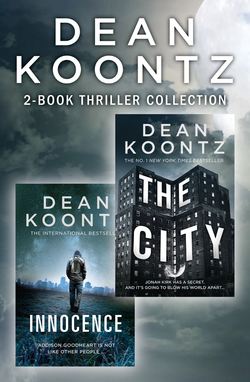Читать книгу Dean Koontz 2-Book Thriller Collection: Innocence, The City - Dean Koontz, Dean Koontz - Страница 37
Twenty-six
ОглавлениеWITH SOME EFFORT, I REASONED MYSELF INTO waiting to return to Gwyneth’s place until the agreed-upon time. After all, I had known her for less than a day. Although our relationship had developed with almost miraculous ease, if I showed up unannounced at first dark, two hours before expected, regardless of my excuse, I would seem to be disrespecting her wishes. Worse, a girl so afflicted with social phobia that she couldn’t bear to be touched would find my eagerness off-putting.
I understood—or thought I did—why she had felt comfortable with me even though she recoiled from most, if not all, of humanity. The extreme repugnance with which people responded to the sight of me, the fact that I was an abomination to them, allowed Gwyneth to think of me as such an outsider to the human race that her phobia hardly applied in my case. At the same time, because I lived in solitude and she in deep seclusion, our emotional lives must have been to some extent similar, and that shared experience in part formed the basis of her affinity for me.
I hoped that she would eventually feel as tenderly toward me as perhaps she had once felt toward her father. I expected no more, and no more was possible between one who could not be seen and one who could not be touched. After six years of solitude, a friend was the most extravagant gift I could be given, the most for which I hoped.
To reduce the risk that the girl would accidentally be exposed to the shock of my face, to allow us a little more light during our time together, and as a precaution against being recognized for what I am in the streets during these busy evening hours, I wore a ski mask in addition to the hood. There were holes only for my eyes and a loose slash at the mouth. I could breathe easily through the knitting, and I was confident that this cold December evening would justify a mask even to the most suspicious observer.
As I passed beneath the city, on my way to her building near Riverside Commons, I decided that because of Gwyneth’s condition, I would be unwise to mention those things we of the hidden see that no one else does. She had her mysteries, too, which she acknowledged but kept pocketed. In the interest of not being so exotic that I became entirely alien to her, I would pay out my secrets as slowly as she paid out hers.
This time, I avoided Power Station 6 beneath the park, because more people worked the swing shift than those on the graveyard crew. To facilitate the pumping out of transit-system tunnels in a flood, there are work shafts connecting them to the storm-drain system at key points. From one iron rung to the next, I descended one of these, a thirty-foot-long pipe, five feet in diameter, not far from the Commons. As I neared the bottom, a fast train shuttled past in the darkness below me, which meant that I would have at least three minutes until the next one shrieked through. I needed to go only a hundred yards in the subway tunnel, being careful to avoid the electrified third rail, before coming to an emergency-exit door that opened inward to a switchback of wide stairs leading to the surface.
Some such exits terminated in public places, often stations on the line, and were therefore useless to me. This one, however, had once led to the ground floor of the Fifty-seventh Street Armory, which had been torn down nine years earlier during one of the city’s periodic redevelopment frenzies. While the architect’s plans were finalized for the ambitious affordable-housing project that was intended for the site, a temporary stairhead shack had been constructed to receive the emergency stairs from the subway. In hard times, the city had yet to find the funding, and the shack still stood, the door always unlocked from the inside.
I needed to cross one secondary street, follow a short block of alleyway, cross a well-traveled avenue, and navigate a narrow service passage between two grand old houses to arrive behind Gwyneth’s place. Only the midblock dash across the avenue gave me pause, for there were streetlamps and the headlights of oncoming traffic. But masked, hooded, jacketed, and gloved as I was, I elicited nothing more than one angry motorist’s horn.
At the back of her building, lights glowed warmly in apartments on the first and third floors. Ascending the fire escape, I was much relieved to find the draperies fully closed at the second-floor window through which I had watched the Fog be received into the silk-robed man.
At the top landing, the lower sash of the double-hung window had been left open, the bedroom dark beyond. The door on the farther side of the room stood open to the hallway where prismatic light from the cut-crystal ceiling fixture left spear and arrowhead patterns on the wall, with here and there a bright shard of color broken out of the spectrum—blue, indigo, and red.
When I crossed the windowsill and stepped into the room, I knew at once that something must be wrong.
